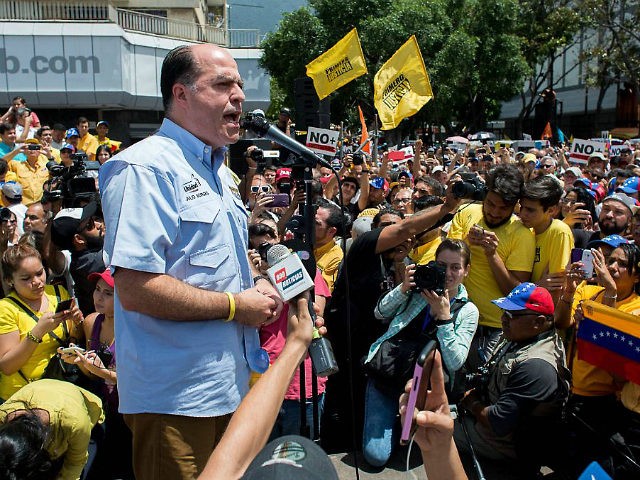National Security Adviser H.R. McMaster and Vice President Mike Pence met with Venezuela’s National Assembly President Julio Borges this weekend to discuss the opposition’s attempt to re-establish democratic order in that nation following eighteen years of socialist rule.
As the head of the opposition-controlled National Assembly, Borges is a prominent leader of the movement to remove dictator Nicolás Maduro and end the wave of police brutality against unarmed protesters that has continued for the past month, particularly in the nation’s capital, Caracas. Protests have continued on a daily basis since the Supreme Court attempted to establish itself as the legislative body of the country, nullifying the National Assembly, in late March.
According to a readout published by the White House, McMaster met Borges on Sunday, and the two “discussed the ongoing crisis in Venezuela and the need for the government to adhere to the Venezuelan Constitution, release political prisoners, respect the National Assembly, and hold free and democratic elections.”
“They agreed that there is a strong need to bring the crisis to a quick and peaceful conclusion,” the White House concluded.
Less is known about Borges’ meeting with Pence. The vice president’s communications director, Jarrod Agen, confirmed that the two met on Friday, as did the National Assembly in a statement about Borges’ visit to the United States. That statement concluded, quoting Borges, that the socialist regime in Venezuela “has become a problem for the entire region and we are requesting that all Latin America help us find democratic solutions.”
Also on Borges’ agenda was a meeting with Luis Almagro, the Secretary General of the Organization of American States (OAS). The OAS has sharply criticized the socialist dictatorship of head of state Nicolás Maduro, with Almagro demanding free and fair elections and a return to the democratic order (all members of the OAS must adhere to democratic standards).
In response, Maduro began the official process to withdraw from the organization last month. Borges’ visit was, in part, an attempt to undo Maduro’s decision, handing Almagro National Assembly documents meant to express the legislature’s desire to remain within the organization.
Should Maduro succeed, the withdrawal process takes two years, which would still leave time for the OAS to subject Venezuela to its censure. Borges’ message clearly states that the constitution prevents either the executive or legislative branches from unilaterally choosing to withdraw from international commitments.
Last week, Maduro called for the creation of an alternative “Constituents’ Assembly” to usurp the power of the National Assembly and write a new constitution to replace the current one, in a move to weaken the opposition’s legal arguments against him.
In an interview published in the Spanish newspaper El Páis Friday, Borges appears satisfied with the interest that the United States government has expressed in helping his country overthrow its current oppressive regime. America’s “posture is very clear in the Venezuelan case,” he said. “It was not always like this, but everyone in the world now knows that Venezuela is in chaos, not democracy.”
“We are very appreciated of this, that the situation in Venezuela is at the forefront of the United States’ international agenda. This is fundamental support to reach a democratic solution,” he added.
Borges has similarly praised the Trump administration in a previous interview. In April, he told the Washington Times, “In all of Trump’s conversations with leaders in Latin America, the topic of Venezuela comes up — and it’s raised by him.” He added, for the opposition, it was “very important to us that he [Trump] be a factor helping to create maximum international pressure.”
As a presidential candidate, Trump made his opposition to the Venezuelan socialist regime vocal. “Venezuela is a beautiful, vibrant, and resource-rich country, filled with amazing and hardworking people. But Venezuela has been run into the ground by socialists,” Trump said at a campaign stop in September.
As president, Trump notably invited Lilian Tintori, wife of opposition party leader and political prisoner Leopoldo López, to the White House in February, and called for her husband’s freedom. The Trump administration has also branded the nation’s vice president, Tareck El Aissami, a “Drug Kingpin” and frozen his assets in the United States in response to his ties to terrorist organizations like Hezbollah and drug trafficking operations on the continent.
Borges assumed the leadership of the National Assembly in January, taking over for Socialist International Vice President Henry Ramos Allup. Prior to that, Borges was among the most vocal National Assembly deputies against Maduro, participating in protests against the president.
Last year, armed pro-socialist gangs known as “colectivos” attacked Borges at a public hearing, breaking his nose in front of the National Electoral Council and beating him with metal sticks.

COMMENTS
Please let us know if you're having issues with commenting.